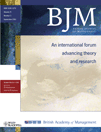Research
ISO-9000 Certification and Ownership Structure: Effects upon Firm Performance
Abstract
ISO certification has become a pervasive mechanism adopted by firms to improve their operational performance. In this paper, we examine the operational and organizational factors that increase the likelihood of adopting ISO certification and the impact that ISO certification and ownership structure have upon firm performance. Using a sample of 163 Spanish manufacturing firms for the period 1996–2000 we perform a rare events logit model and a regression analysis. Our findings show that firms producing intermediate goods that have implemented just-in-time practices are more likely to adopt ISO certification. Furthermore, we report a strong influence of the ownership structure upon ISO adoption policy, especially when a multinational firm is the largest shareholder. Empirical evidence supports that ISO certification and ownership structure positively impact firm performance. However, our results indicate that the positive impact of ISO certification on performance diminishes in firms where ownership is highly concentrated.
Authors
Esteban Lafuente1, Alberto Bayo-Moriones2 and Miguel García-Cestona1

